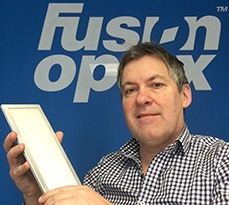Terence Yeo, Founder and CEO of LED lighting products company Fusion Optix and a Cambridge MBA alumnus (MBA 2001), says that managing oneself is key to success in entrepreneurship. Terence founded the company in 2003 while sharing a house in Cambridge with two MBA colleagues who were also launching their own firms at the same time.
Based near Boston, Massachusetts, Fusion Optix employs 50 people and holds more than 50 patents protecting inventions that help save energy while delivering controlled light and colour. The company has ranked on the Deloitte Fast500 Technology, Inc5000, and Red Herring Top100 lists, and says that its optical components and LED engines can deliver up to 80 per cent improvement in efficiency when compared to incandescent lighting sources.

We asked Terence a few questions about startups, leadership and the Cambridge MBA:
You previously studied engineering and physics, and then got involved in startups. Why did you decide to switch sectors?
Entrepreneurship has satisfied my urge to bring ideas out into the real world and build businesses around them. My studies gave me a foundation, but my sights were always set on an end product or result. I was never fully satisfied with being in a laboratory or in front of a computer screen modelling something.
What are the biggest challenges for an entrepreneur?
Probably the biggest challenge is managing oneself. I still have the same passion for what I do, but over the years I’ve had to learn and evolve to stay ahead in very competitive industry. At times I have also had to face my limitations, handle extreme stress and tackle highly nuanced interpersonal situations. Interacting with the myriad of people such as customers, employees and investors can be extremely demanding. Sometimes it’s impossible to please everyone, and you need to have a thick skin whilst maintaining empathy and a willingness to consider other points of view.
Why do you think a lot of startups are out of business in the first five years?
Startups begin for a wide range of reasons, but to survive there has to be clear differentiation and a fundamental reason for any venture to exist. Some entrepreneurs forget that customers need to see a strong reason to give you their money. Founders and early investors can get sucked into a mindset that is more focused on what they want to achieve as opposed to a realistic assessment of the value their customers see.
What are some of the other pitfalls for startups?
Singlemindedness can be a strength but startups often filter out potentially valuable early feedback if it doesn’t fit their narrative. Negative feedback or the realisation that the world you were aiming to conquer doesn’t see your worth can be hard to take. Startups can also make simple financial mistakes such as taking on too much overheads or debt, or they might get locked into a mindset of chasing investor’s valuations and cash rather than developing and perfecting a sustainable business model.
What makes a good leader?
First and foremost a good leader needs to have both a vision and a plan, as well as the skills and commitment to follow through. Most successful leaders also understand leadership as a process and can identify, manage and motivate resources to pursue common goals in line with a clear plan. This includes building structure and order supported by a positive culture of shared purpose.
How has the Cambridge MBA contributed to your career and personal development?
The Cambridge MBA has turned out to be a launching pad for Fusion Optix. Firstly, it gave me a unique opportunity to take stock, and to recharge and refocus in a setting that is extraordinarily full of academic, business and cultural influences. Cambridge as a whole was incredibly motivational, because of all the transformational innovations and businesses that have emerged from its campus or been inspired by it. Outside of my studies I met many extraordinary people and gained crucial “insider” experience in venture capital from a leading firm, Amadeus Capital. I learned how to combine my knowledge of physics and optics with my knowledge of business. That combination has been essential to the growth and success of Fusion Optix.


